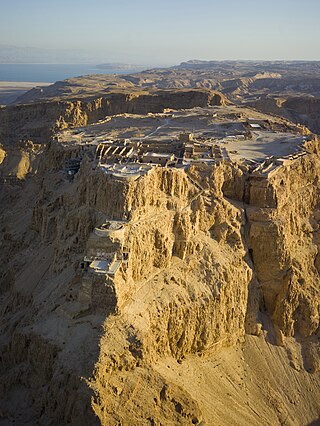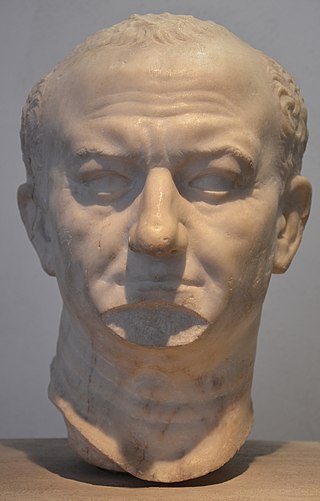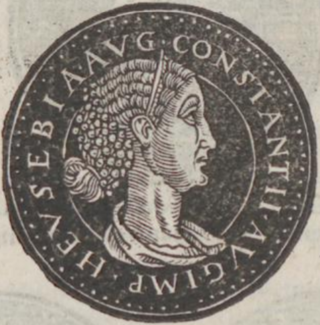Related Research Articles

Flavius Josephus was a Roman–Jewish historian and military leader. Best known for writing The Jewish War, he was born in Jerusalem—then part of the Roman province of Judea—to a father of priestly descent and a mother who claimed royal ancestry.

Year 337 (CCCXXXVII) was a common year starting on Saturday of the Julian calendar. At the time, it was known as the Year of the Consulship of Felicianus and Titianus. The denomination 337 for this year has been used since the early medieval period, when the Anno Domini calendar era became the prevalent method in Europe for naming years.

Zeno was Eastern Roman emperor from 474 to 475 and again from 476 to 491. He was originally from the district of Isauria, which is now part of modern day Turkey, and changed his name from Tarasis to Zeno while serving under Leo I.

Tiberius III, born Apsimar, was Byzantine emperor from 698 to 705. Little is known about his early life, other than that he was a droungarios, a mid-level commander, who served in the Cibyrrhaeot Theme. In 696, Tiberius was part of an army sent by Byzantine Emperor Leontius to retake the North African city of Carthage, which had been captured by the Arab Umayyads. After seizing the city, this army was pushed back by Umayyad reinforcements and retreated to the island of Crete. As they feared the wrath of Leontius, some officers killed their commander, John the Patrician, and declared Tiberius the emperor. Tiberius swiftly gathered a fleet and sailed for Constantinople, where he then deposed Leontius. Tiberius did not attempt to retake Byzantine Africa from the Umayyads, but campaigned against them along the eastern border with some success. In 705, former emperor Justinian II, who had been deposed by Leontius, led an army of Slavs and Bulgars from the First Bulgarian Empire to Constantinople, and after entering the city secretly, deposed Tiberius. Tiberius fled to Bithynia, but was captured a few months later and beheaded by Justinian between August 705 and February 706. His body was initially thrown into the sea, but was later recovered and buried in a church on the island of Prote.

The siege of Masada was one of the final events in the First Jewish–Roman War, occurring from 72 to 73 AD on and around a hilltop in present-day Israel.

Nepotianus, sometimes known in English as Nepotian, was a member of the Constantinian dynasty who reigned as a short-lived usurper of the Roman Empire. He ruled the city of Rome for twenty-eight days, before being killed by his rival usurper Magnentius' general Marcellinus.

Victor was a Western Roman emperor from either 383/384 or 387 to August 388. He was the son of the magister militum Magnus Maximus, who later became a usurper of the Western Roman Empire, in opposition to Gratian. Maximus rose up in 383, and was recognized as the legitimate emperor in the west by Theodosius I. Victor was elevated to augustus of the Western Roman Empire in either 383/384 or mid-387, making him co-emperor with his father. Maximus invaded Italy in 387, to depose Valentinian II, the brother and successor of the late Gratian. Because of Maximus' invasion, Theodosius invaded the Western Empire in 388. Theodosius defeated Maximus in two battles in Pannonia, before crushing his army at Aquilea, and capturing Maximus. Maximus was executed on 28 August 388. His death was followed quickly by that of Victor, who was executed in Trier by the Frankish general Arbogast.

The gens Flavia was a plebeian family at ancient Rome. Its members are first mentioned during the last three centuries of the Republic. The first of the Flavii to achieve prominence was Marcus Flavius, tribune of the plebs in 327 and 323 BC; however, no Flavius attained the consulship until Gaius Flavius Fimbria in 104 BC. The gens became illustrious during the first century AD, when the family of the Flavii Sabini claimed the imperial dignity.

Licinia Eudoxia was a Roman Empress, daughter of Eastern Roman Emperor Theodosius II. Her husbands included the Western Roman Emperors Valentinian III and Petronius Maximus.

The praetorian prefecture of Illyricum was one of four praetorian prefectures into which the Late Roman Empire was divided.
Titus Flavius Titi filius Titi nepos Clemens was a Roman politician and cousin of the emperor Domitian, with whom he served as consul from January to April in AD 95. Shortly after leaving the consulship, Clemens was executed, allegedly for atheism, although the exact circumstances remain unclear. Over time, he came to be regarded as an early Christian martyr.
Flavius Appalius Illus Trocundes was a general of the Eastern Roman Empire, involved in the rise and fall of Emperor Basiliscus and the rebellion against Emperor Zeno.
Flavius Marcianus was a member of the Leonid dynasty. The son of the Western emperor Anthemius, Marcianus married Leontia, the daughter of the Eastern Roman emperor Leo I. He was consul twice, and in 479 unsuccessfully attempted to overthrow the emperor Zeno. After his capture he was forced to become a monk; he escaped and raised an army but was defeated and recaptured by Flavius Appalius Illus Trocundes. In 484, when the Isaurian general Illus revolted against Zeno, Marcianus was freed and Illus proclaimed him emperor, before deposing him in favour of Leontius.

The praetorian prefecture of the East, or of the Orient was one of four large praetorian prefectures into which the Late Roman Empire was divided. As it comprised the larger part of the Eastern Roman Empire, and its seat was at Constantinople, the praetorian prefect was the second most powerful man in the East, after the Emperor, in essence serving as his first minister.

Eusebia was the second wife of Roman emperor Constantius II. The main sources for the knowledge about her life are Julian's panegyric "Speech of Thanks to the Empress Eusebia", as well as several remarks by the historian Ammianus Marcellinus.

Leontius was a general of the Eastern Roman Empire and claimant to the throne who led a rebellion against emperor Zeno in 484–488.
Flavius Asclepiodotus or Asclepiades was a politician of the Eastern Roman Empire
Flavius Eusebius was a Roman military officer and politician. He is usually identified as the father of Eusebia, and consequently as the posthumous father-in-law of the Roman emperor Constantius II.
The nomen gentilicium was a hereditary name borne by the peoples of Roman Italy and later by the citizens of the Roman Republic and the Roman Empire. It was originally the name of one's gens by patrilineal descent. However, as Rome expanded its frontiers and non-Roman peoples were progressively granted citizenship and concomitant nomen, the latter lost its value in indicating patrilineal ancestry.
References
- ↑ Dietmar Kienast, The Roman State, p.504
- ↑ The Prosopography of the Later Roman Empire. Vol. 1. pp. 502–503.